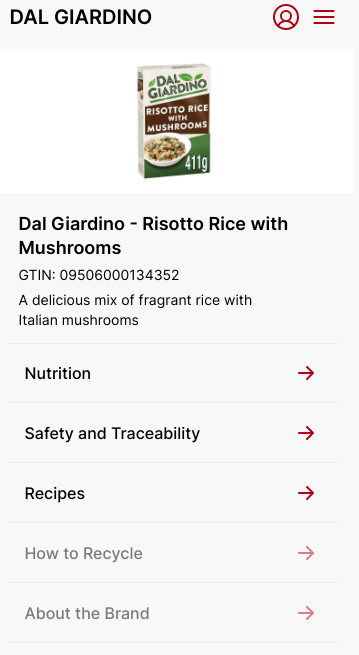How It Works: Basic Example
Unlike the standard UPC barcode, which is currently printed on almost every consumer goods in the world, the migration to the 2D GTIN Digital LInk format will provide consumers with the experience that the brand desires. Whereas a UPC simply stores 12 numeric digits encoding a GTIN, the new GS1 Digital Link data architecture gives the structure to encode extra information (web addresses, serial numbers, expiration dates, and so on).

This basic example encodes the GTIN (09506000134352) and mobile web address for the product.
GTIN Digital Link = https://id.dalgiardino.com/01/09506000134352
This sample is for the fictitious brand, Dal Giardino, and the product is Rissoto Rice with Mushrooms.
When scanned at a grocery store, the GTIN data will only be read, just like today’s UPC barcode. Consumers using a mobile device will be directed to a mobile page specifically for the product. This example shows some of the additional off-pack components that are available.
To see the page, scan the above QR code with the camera app on your mobile device.

IMPORTANT NOTE
Although the idea is straightforward in theory, the implementation is a little more difficult. Behind the scenes, a function that points web lookups to the real product page, like the one above, is programmed in a web domain. Applications for online scanning are controlled by specialized coding or a device referred to as a “resolver.”
If someone wanted to simply go to www.createbarcodes.com to make a QR code with the existing web page and GTIN (UPC), the web address would normally get an error.
For example, Kellogg’s Frosted Chocolate Fudge Pop-Tarts has a UPC of 038000553783, and the product’s divisional website is www.poptarts.com. The GTIN Digital Link https://poptarts.com/01/00038000553783 link would generate a 404 Page not found error.
The actual page https://www.poptarts.com/en_US/products/favorites/pop-tarts-frosted-chocolate-fudge-product.html would have to have been programmed in a resolver. IF the resolver is programmed on the destination website, the GTIN Digital Link https://poptarts.com/01/00038000553783 would correctly point to the above web page.
HOW TO BEGIN GTIN DIGITAL LINK IMPLEMENTATION
We are beginning to have strategic calls with many of our GS1 Barcode Support clients to discuss their needs and establish an implementation time frame. Different industries and product categories have varying traceability needs. In addition, it is crucial for manufacturers’ websites to be 100% mobile ready since QR code scans always come from a phone or tablet.
Since it will be quite some time before every store is capable of reading a QR code at the point-of-sale, the GS1 guidelines are recommending an interim version that includes both a UPC and a digitally linked QR code. The standards agency has been actively testing placement options for the interim format to maximize scanning performance. Positioning the two symbols next to each other horizontally has proven to have minimal impact.

